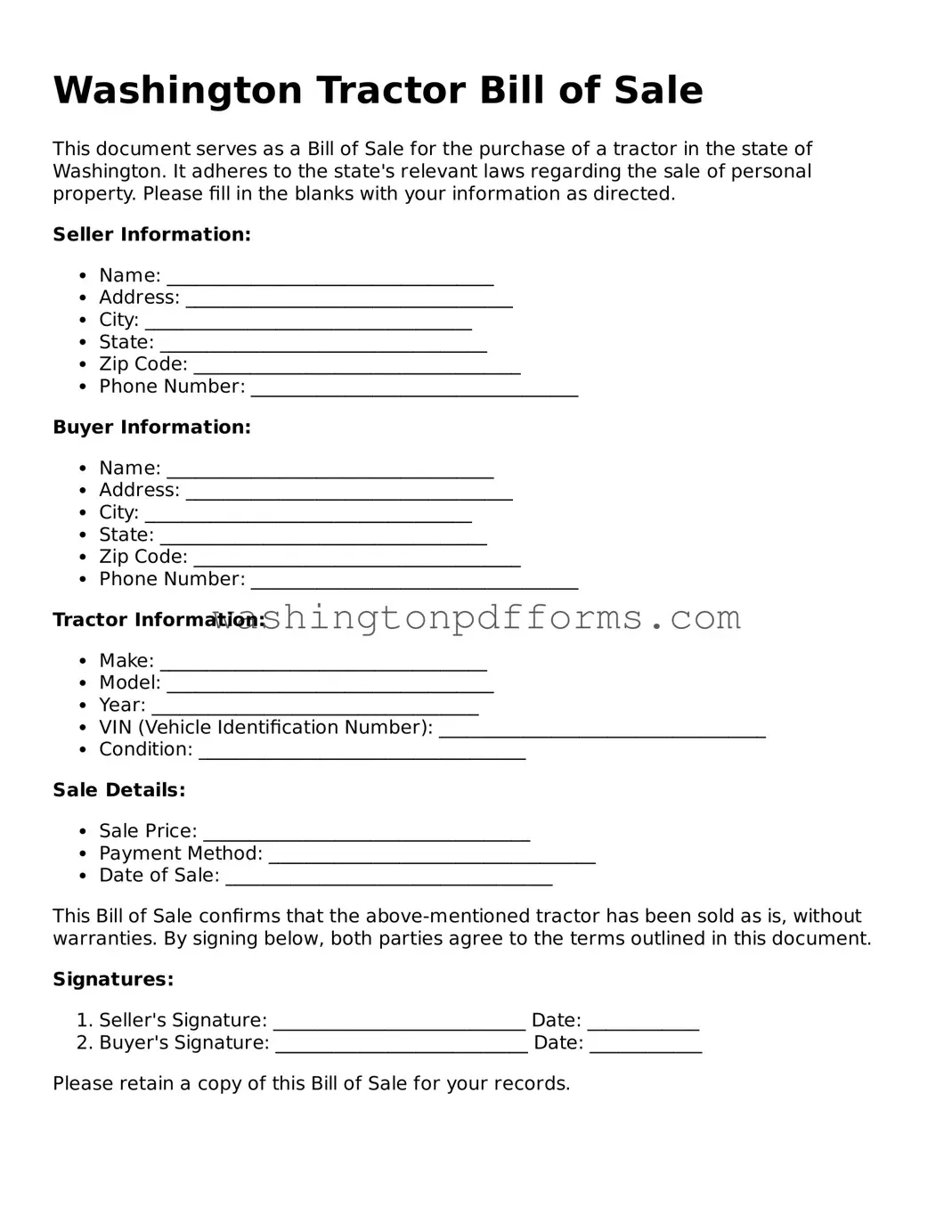Attorney-Approved Washington Tractor Bill of Sale Template
The Washington Tractor Bill of Sale form serves as a crucial document in the transfer of ownership for agricultural machinery within the state. This form captures essential details about the transaction, including the names and addresses of both the buyer and seller, the description of the tractor, and the sale price. It also includes information about the tractor's identification number, which helps to verify its authenticity and ownership history. By documenting the sale, this form provides legal protection for both parties involved, ensuring that the transaction is clear and binding. Additionally, it may be required for registration and titling purposes with the Washington Department of Licensing. Understanding the components and significance of this form is vital for anyone engaged in buying or selling tractors in Washington, as it facilitates a smooth transfer of ownership and helps prevent potential disputes in the future.
Common mistakes
Filling out the Washington Tractor Bill of Sale form can seem straightforward, but many people make common mistakes that can lead to complications down the road. One frequent error is failing to include accurate vehicle identification information. This includes the tractor's make, model, year, and VIN (Vehicle Identification Number). Omitting or miswriting this information can create confusion and may lead to issues with registration.
Another mistake is not providing the correct names and addresses of both the buyer and seller. It’s crucial that these details are clear and accurate. If the names are misspelled or the addresses are incorrect, it can complicate the transfer of ownership and create problems if disputes arise later.
People often overlook the importance of signing the document. Both the buyer and seller must sign the Tractor Bill of Sale for it to be valid. Without these signatures, the document may not hold up in legal situations. Additionally, forgetting to date the form can also lead to issues, as the date of the transaction is an important detail for record-keeping and future reference.
Another common pitfall is neglecting to include the sale price. The amount for which the tractor is being sold should be clearly stated. This figure is necessary for tax purposes and can affect the registration process. If the sale price is missing, it may raise questions during a DMV inspection or audit.
Some individuals fail to provide a complete description of the tractor's condition. This includes noting any existing damages or mechanical issues. Being transparent about the condition helps protect both parties and can prevent misunderstandings after the sale is completed.
Lastly, many people forget to keep a copy of the completed Bill of Sale for their records. Having a copy is essential for both the buyer and seller, as it serves as proof of the transaction. If any disputes arise in the future, this document can be invaluable in resolving issues related to ownership or condition.
Similar forms
- Vehicle Bill of Sale: This document serves a similar purpose by transferring ownership of a vehicle from one party to another. It includes details such as the vehicle's identification number, sale price, and signatures of both parties.
- Boat Bill of Sale: Like the Tractor Bill of Sale, this document is used to transfer ownership of a boat. It contains information about the boat's specifications and the terms of the sale.
- Motorcycle Bill of Sale: This document facilitates the sale of a motorcycle, detailing the bike's make, model, and VIN, along with the buyer and seller's information.
- ATV Bill of Sale: Similar to the Tractor Bill of Sale, this document is used for the sale of an all-terrain vehicle. It includes relevant details about the ATV and the transaction.
- Personal Property Bill of Sale: This document can be used for the sale of various personal items, including machinery or equipment. It outlines the item being sold, the sale price, and the parties involved.
- Texas Bill of Sale: This form serves as a crucial document for personal property transactions in Texas, solidifying the transfer of ownership. It is vital for ensuring clarity and legality in the sale process. For further information, visit https://topformsonline.com/texas-bill-of-sale/.
- Real Estate Purchase Agreement: While focused on property, this agreement also transfers ownership. It specifies terms, conditions, and details about the property being sold.
- Business Bill of Sale: This document is used when selling a business or its assets. It outlines the terms of the sale and includes information about the business being transferred.
- Farm Equipment Bill of Sale: Similar to the Tractor Bill of Sale, this document is specific to farm equipment sales, detailing the equipment involved and the transaction terms.
- Lease Agreement: While not a sale, this document outlines the terms under which one party may use property owned by another. It includes details about duration, payment, and responsibilities.
Some Other Washington Templates
Work Letter Template - Confirm past and present job roles with this verification form.
To streamline the process of obtaining financing, it is essential for businesses to utilize a properly filled Business Credit Application form, readily available at smarttemplates.net, which guides applicants through the necessary financial disclosures and references needed by lenders.
Release and Hold Harmless Agreement - The form clarifies expectations regarding risk between parties.
